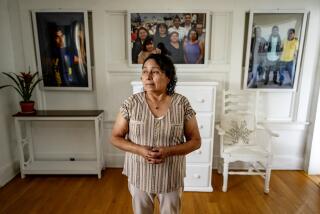Stress Disorder Defense Fails in Slaying Case
- Share via
A jury convicted Dick Keech of first-degree murder Tuesday, rejecting his unusual defense that the stress of being a prisoner in World War II caused him to shoot his son-in-law to death last year in a quiet Long Beach neighborhood.
In a verdict likely to send Keech, 78, to state prison for the rest of his life, Long Beach Superior Court jurors found him guilty of murdering Nick Candy on May 21, 1996.
As the verdict was read, Keech’s lower lip quivered briefly. A few moments later, he hugged his attorney and waved to his family, flashing a quick smile. Then, head high and hands clasped behind him in the manner of the Marine he once was, he was led off to jail.
Outside the courtroom, Deputy Dist. Atty. Amy-Hannah Broersma praised jurors for exercising common sense. “Maybe I shouldn’t say this,” she said, “but when I initially heard the defense, my reaction was: ‘Hee-hee, giggle-giggle. Let’s not lose our common sense here; that’s ridiculous.’ ”
The jury forewoman declined to comment on deliberations. So did other jurors leaving the courthouse. An alternate juror, Thomas Kennedy, 26, of Torrance, said he had sympathy for Keech, but added: “That didn’t give him the right to take another man’s life.”
Defense lawyers, however, said they were stunned. They had contended during the trial that Keech suffers from post-traumatic stress disorder and shot Candy in a flashback to the 40 months he endured as a prisoner of Japan during World War II.
“I figured voluntary manslaughter, tops,” said Albert C.S. Ramsey, a lawyer for more than 60 years. He added: “It shocks me that this jury showed absolutely no compassion.”
Asked about the defense strategy, co-counsel Edward P. George Jr. said it “was apparently rejected by the jury,” adding, “That’s not unusual in criminal cases.”
What would have been unusual, legal experts said, is if the jury had bought the defense tactic.
“It was a stretch for them to try a post-traumatic stress disorder defense,” said Laurie Levenson, associate dean at Loyola Law School and a former federal prosecutor.
“Certainly Paul Mones is one of the best in this area,” Levenson said, referring to the Portland, Ore.-based attorney who advised Keech’s lawyers. And, she said, “there are situations where the defense [employed in this case] should apply,” perhaps to a veteran flashing back to a wartime experience after hearing, say, a backfiring muffler.
But jurors in a homicide case almost always approach such a strategy with skepticism, Levenson said, because a verdict other than first-degree murder “opens the door for everybody to argue their own syndrome whenever they need an excuse for a killing.”
Post-traumatic stress disorder is a widely recognized affliction that bedevils combat veterans as well as police officers, battered women, rape victims, disaster survivors and others.
Keech’s POW experiences took place more than 50 years ago. After service with the Marines in China, he was captured at Corregidor in the Philippines in May 1942 and spent the rest of the war--until September 1945--behind bars.
Upon returning home, he fashioned a reputation as the most solid of citizens. Thirty-plus years at the same job at Rockwell before retiring. Married for 48 years. Four children.
Keech’s daughter, Nancy, married Candy in 1991.
They had a son, Martin, in September 1994.
In August 1995, they split up, launching a bitter custody battle.
And on May 21, 1996, Keech shot his son-in-law to death.
That Tuesday evening, Nick Candy--a contracts administrator at Universal Studios who had received his master’s degree in business just weeks before--showed up at the peach-colored stucco house in Long Beach, where Nancy Candy lived with her parents, to pick Martin up for a visit.
The two men began arguing at the front door, then moved to the sidewalk. Keech pulled a 9-millimeter handgun from his waistband and shot Candy once, in the abdomen. Candy ran down the street, yelling, “Help me! Help me!” Keech followed. Candy fell. Keech shot him four more times, three times in the back, once at the base of the skull, according to testimony.
Keech, who was on the stand six days, said he believed that Candy--who was unarmed--was going to punch him. That’s why he fired the first shot, he testified.
The others, he said, came while he was on “autopilot,” apparently believing he was shooting at a Japanese prison guard.
A defense expert testified that Keech suffers from post-traumatic stress disorder.
Under cross-examination by prosecutors, however, UCLA psychologist Calvin Frederick also testified that Keech had never sought treatment for the disorder and had not been diagnosed until seven months after the shooting.
A prosecution expert, Oregon psychologist Loren Pankratz, said that the disorder is easy to feign and that he did not believe Keech suffers from it.
Jurors got the case--which began in September--Nov. 18 and reached their verdict Monday afternoon. Judge William T. Garner waited until Tuesday to have it opened.
Garner set sentencing for Jan. 20. Keech faces a maximum of 35 years to life in prison.
Nancy Candy, who sobbed as sheriff’s deputies led her father away, declined comment outside the courtroom.
Jocelyne Candy Bunyan, Nick Candy’s sister, said by telephone from Florida, where she lives, that she had “mixed feelings.”
Referring to Keech and his daughter, she said: “May God have mercy on his soul, and hers.”
Then, speaking solely of Keech, she added: “May this Satan rot in jail. I cannot forgive him for what he did. It was coldblooded murder. He hated my brother, and he decided he was just going to get rid of him.”
More to Read
Sign up for Essential California
The most important California stories and recommendations in your inbox every morning.
You may occasionally receive promotional content from the Los Angeles Times.










